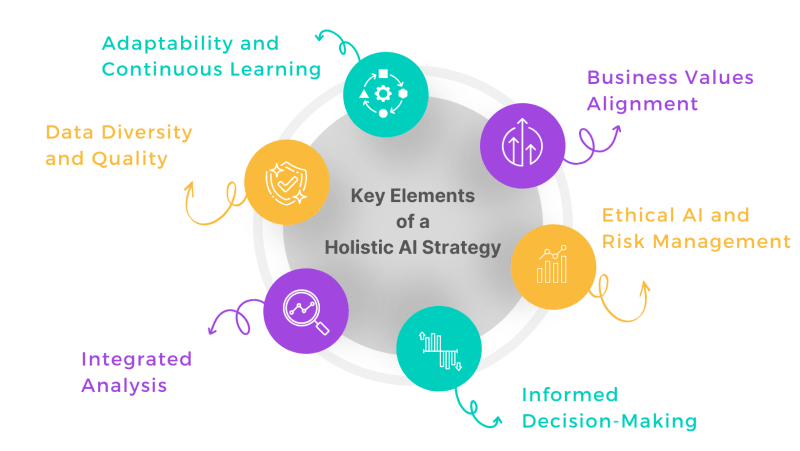Embracing a holistic approach to Artificial Intelligence (AI) means integrating it comprehensively into your business, going beyond just algorithms and data. It's about creating a synergy between diverse aspects like data gathering, analysis, decision-making, ethics, and risk management to craft solutions that resonate with your company's heartbeat.
Key Elements of a Holistic AI Strategy
Data Diversity and Quality: It's not just about collecting vast amounts of data, but gathering diverse, high-quality data that reflects your business's various facets and the environment it operates in. This approach enables AI systems to provide more nuanced, accurate insights.
Integrated Analysis: By breaking down departmental silos, holistic AI merges data from different sources, offering deeper, more comprehensive insights into business challenges and opportunities.
Informed Decision-Making: AI in this context is a tool that aligns with your strategic goals, informing decisions ranging from day-to-day operations to long-term strategic plans.
Ethical AI and Risk Management: This approach involves proactive risk management, including ethical considerations. It ensures AI systems are transparent, fair, bias-free, and in compliance with legal standards.
Business Values Alignment: A holistic AI strategy is in harmony with your business's broader objectives and values, using AI to drive sustainable practices, enhance customer experience, and foster an innovative, inclusive workplace culture.
Adaptability and Continuous Learning: Holistic AI is dynamic, continuously learning from new data and adapting to market changes, ensuring applications remain relevant and effective.
Benefits of a Holistic Approach
- Enhanced Decision-Making: This approach leads to better-informed, strategic decisions by providing a multi-dimensional view of data.
- Effective Risk Management: Recognizes and mitigates potential risks, including data breaches and biases.
- Ethical Deployment: Reflects the company’s ethical standards, avoiding moral dilemmas and negative public perception.
How Holistic AI Functions
Think of it as a well-orchestrated symphony where each element, from multi-dimensional data collection, advanced analytics, and decision support systems, to risk assessment and ethical alignment, plays a crucial role. This integration creates a powerful, effective outcome, making the AI not just a tool but an integral part of the organization, contributing to overall growth and competitiveness.
Overcoming Myths
- Beyond Hardware: Holistic AI goes beyond advanced computer hardware, focusing on the integration of AI components.
- Simplicity in Complexity: Despite intricate algorithms, tools are designed to simplify management and implementation.
- Universal Applicability: Suitable for all business sizes, aligning AI capabilities with unique objectives and values.
- More Than a Trend: It's a fundamental aspect of our technological future.
Real-World Impact
From revolutionizing inventory management and customer service in retail to enhancing patient care in healthcare, and improving risk management in finance, holistic AI has diverse, impactful applications.
Conclusion
A holistic approach to AI intertwines technology with every facet of your business, ensuring AI aligns with your company’s goals, ethics, and risk strategies. It's not just about adopting technology; it's about integrating AI into your business’s DNA for transformative, responsible, and sustainable growth. In today's AI-driven world, this approach is crucial for any business aiming to leverage AI's full potential effectively and responsibly.




Top comments (0)